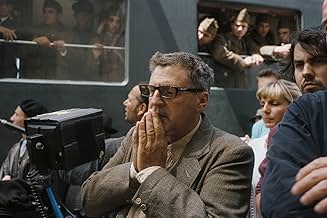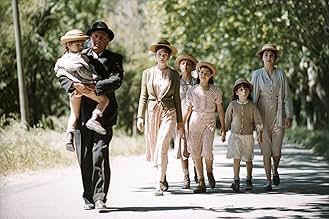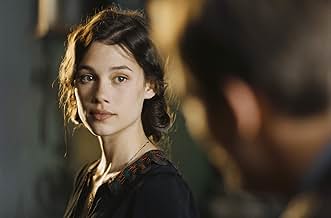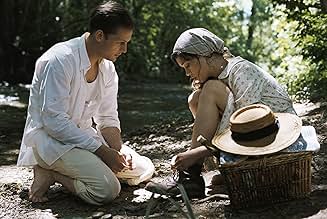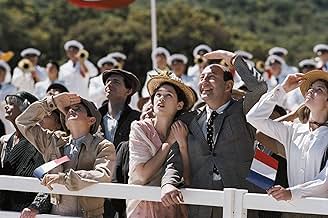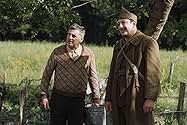IMDb-BEWERTUNG
7,0/10
4361
IHRE BEWERTUNG
Im Südfrankreich der 1930er Jahre ist ein Vater zwischen seinem Ehrgefühl und seiner tiefen Liebe zu seiner Tochter hin und her gerissen, als sie mit dem wohlhabenden Sohn eines Ladenbesitze... Alles lesenIm Südfrankreich der 1930er Jahre ist ein Vater zwischen seinem Ehrgefühl und seiner tiefen Liebe zu seiner Tochter hin und her gerissen, als sie mit dem wohlhabenden Sohn eines Ladenbesitzers in Schwierigkeiten gerät.Im Südfrankreich der 1930er Jahre ist ein Vater zwischen seinem Ehrgefühl und seiner tiefen Liebe zu seiner Tochter hin und her gerissen, als sie mit dem wohlhabenden Sohn eines Ladenbesitzers in Schwierigkeiten gerät.
- Regie
- Drehbuch
- Hauptbesetzung
- Auszeichnungen
- 2 wins total
Empfohlene Bewertungen
Daniel Auteuil is one of my favorite actors... in the world.
I rented this film earlier tonight from Video Futur, a French movie rental chain, after missing it at the cinéma. My girlfriend and I just finished watching it. Wow.
It's fantastic !!! Of course, you should start with the Marcel Pagnol classics like Jean de Florette and Manon des Sources. Read the books, watch the films, fall in love with the south of France. If you're already familiar with the works of Pagnol, you can jump right in and enjoy. Heck, even if you're not familiar with them, watch this film anyway.
In my opinion, Provence is the most beautiful place in France, and possibly the world. Pagnol used real locations in Provence, including Aubagne, Salon, and other locales as the settings for his best dramas.
This is no exception. La fille du puisatier (English: The welldigger's daughter) is a well-crafted story that I believe Americans, and cinema fans all over the world, will enjoy. The film is an excellent and faithful adaptation of Pagnol's original story, and the actors' performances elevate this film to the highest level.
Auteuil, along with co-stars Kad Merad and Jean-Pierre Darroussin knock this thing out of the park. I remember Merad and Darroussin from other films, including L'immortel (English: 22 bullets), but this takes the cake.
This is not to take away from the amazing performances of the daughter in the title, Astrid Bergès-Frisbey as Patricia Amoretti, as well as the solid performance of Emilie Cazenave as her sister Amanda.
All in all, great acting, great writing (based on an already-good story) and beautiful cinematography, made for a completely enjoyable viewing experience, at least for us.
I hope this comes out soon in the US so that American audiences can see for themselves.
I remember seeing Jean de Florette and Manon des Sources (English: Manon of the spring) in my high school French class. My teacher was nice enough to share some French movies with us. Decades later, I'm lucky enough to be living in France, putting all those French lessons to good use, enjoying Pagnol again, and dreaming, everyday, about moving back to the south.....to Provence.
I rented this film earlier tonight from Video Futur, a French movie rental chain, after missing it at the cinéma. My girlfriend and I just finished watching it. Wow.
It's fantastic !!! Of course, you should start with the Marcel Pagnol classics like Jean de Florette and Manon des Sources. Read the books, watch the films, fall in love with the south of France. If you're already familiar with the works of Pagnol, you can jump right in and enjoy. Heck, even if you're not familiar with them, watch this film anyway.
In my opinion, Provence is the most beautiful place in France, and possibly the world. Pagnol used real locations in Provence, including Aubagne, Salon, and other locales as the settings for his best dramas.
This is no exception. La fille du puisatier (English: The welldigger's daughter) is a well-crafted story that I believe Americans, and cinema fans all over the world, will enjoy. The film is an excellent and faithful adaptation of Pagnol's original story, and the actors' performances elevate this film to the highest level.
Auteuil, along with co-stars Kad Merad and Jean-Pierre Darroussin knock this thing out of the park. I remember Merad and Darroussin from other films, including L'immortel (English: 22 bullets), but this takes the cake.
This is not to take away from the amazing performances of the daughter in the title, Astrid Bergès-Frisbey as Patricia Amoretti, as well as the solid performance of Emilie Cazenave as her sister Amanda.
All in all, great acting, great writing (based on an already-good story) and beautiful cinematography, made for a completely enjoyable viewing experience, at least for us.
I hope this comes out soon in the US so that American audiences can see for themselves.
I remember seeing Jean de Florette and Manon des Sources (English: Manon of the spring) in my high school French class. My teacher was nice enough to share some French movies with us. Decades later, I'm lucky enough to be living in France, putting all those French lessons to good use, enjoying Pagnol again, and dreaming, everyday, about moving back to the south.....to Provence.
Remaking a Pagnol film is asking for trouble. Film snobs will dismiss the remake without giving it a chance, though 60 years ago those same film snobs probably dismissed Pagnol as a film director, finding him hopelessly inferior to Renoir or ... Afficionados of Raimu, an unquestionably great actor - when he had a good role - will say that no one can do what he did. And they would be right; no one can out-Raimu Raimu. A force of nature, because Raimu at his best was a force of nature, cannot be imitated or equaled. But a role can be done a different way, even if the words are the same, just as different great actors can succeed at Hamlet or King Lear. And yes, I speak of Shakespeare. Theater/literature snobs can guffaw, but who cares? Let them go about their business.
And I will go about mine, which is to talk about this movie, which is remarkably moving. Moving in part because Pagnol's script was a masterpiece, yes, but also because this is a very well-done realization of it.
The first thing that struck me about this movie was the color, when you see the scenery. Pagnol, for whatever reason, really didn't do a lot with scenery in his black and white movies. This movie shows what that deprived us of. It is done in the best tradition of the color versions of Jean de Florette, Manon des sources, La gloire de mon père, and Le château de ma mère. The countryside around Salon de Provence comes alive, and is beautiful.
I was also struck by the use of music, which again is not a high point in Pagnol's version. The Italian song, so wonderfully recorded by Caruso, is used in very moving ways here. Auteuil has a better sense of how to use music in a film than Pagnol did, at least with this script.
But the heart of this movie is Pagnol's text, and this cast, a great one, does it beautifully. True, at times, as I marveled at the genius of Pagnol's text, I wondered if that meant these actors were acting it, rather than becoming the characters. That may be true in some cases, though not for Kad Merad, who becomes Philippet every bit as much as Fernandel did. I can hear Raimu reciting the lines Daniel Auteuil speaks, and beautifully, perhaps because they are so different, certainly because Raimu delivered them in a way that engraved them in my memory. But Auteuil makes them very moving as well. He is not a force of nature as Raimu was, but his Pascal is also a real character.
What I realized, over and over again watching this movie, is that the script was indeed written by a playwright, and Auteuil respects that. We still have fully-developed scenes, as movies used to have when they were still imitating theater. And, as a result, with this great script and these great actors, we have deeply moving moments, such as when Pascal says goodbye to his daughter, sending her off to raise her bastard child elsewhere. Or, even more deeply moving, when the parents of the father of her child, having just lost their son in the war, come to see the child, the last remnant of their now lost son. Every line of that scene is deeply moving: Pascal's pride in his grandson, the parents' grief and longing for their son. (I didn't care for the mother's final admission that she burned her son's letter rather than deliver it to Patricia; that was better done in the previous version.)
A film script is like a play: it can be done in more than one way, if it's worth doing - as this script most certainly is. It will not wipe away memories of Pagnol's 1940s version, nor should it. You don't have to forget Olivier's Hamlet to love Jacobi's, or Branaugh's, or ... I suspect the very film snobs who dismiss Pagnol's own work will cause this film not to enjoy the success it deserves, but that would be a real crime. This is, in fact, a wonderful realization of Pagnol's very beautiful, very wonderful script.
---------------------------------
I watched this movie again this evening, and really have nothing to add to what I wrote before, other than to say that it is a beautiful realization of Pagnol's script. Auteuil, Merad, and Darroussin are three of modern French film's finest actors, and they all give first-rate performances here. The often wonderful dialogue is delivered as in a great movie or play, lovingly and beautifully. Watch this. It's a deeply moving and wonderful movie.
And I will go about mine, which is to talk about this movie, which is remarkably moving. Moving in part because Pagnol's script was a masterpiece, yes, but also because this is a very well-done realization of it.
The first thing that struck me about this movie was the color, when you see the scenery. Pagnol, for whatever reason, really didn't do a lot with scenery in his black and white movies. This movie shows what that deprived us of. It is done in the best tradition of the color versions of Jean de Florette, Manon des sources, La gloire de mon père, and Le château de ma mère. The countryside around Salon de Provence comes alive, and is beautiful.
I was also struck by the use of music, which again is not a high point in Pagnol's version. The Italian song, so wonderfully recorded by Caruso, is used in very moving ways here. Auteuil has a better sense of how to use music in a film than Pagnol did, at least with this script.
But the heart of this movie is Pagnol's text, and this cast, a great one, does it beautifully. True, at times, as I marveled at the genius of Pagnol's text, I wondered if that meant these actors were acting it, rather than becoming the characters. That may be true in some cases, though not for Kad Merad, who becomes Philippet every bit as much as Fernandel did. I can hear Raimu reciting the lines Daniel Auteuil speaks, and beautifully, perhaps because they are so different, certainly because Raimu delivered them in a way that engraved them in my memory. But Auteuil makes them very moving as well. He is not a force of nature as Raimu was, but his Pascal is also a real character.
What I realized, over and over again watching this movie, is that the script was indeed written by a playwright, and Auteuil respects that. We still have fully-developed scenes, as movies used to have when they were still imitating theater. And, as a result, with this great script and these great actors, we have deeply moving moments, such as when Pascal says goodbye to his daughter, sending her off to raise her bastard child elsewhere. Or, even more deeply moving, when the parents of the father of her child, having just lost their son in the war, come to see the child, the last remnant of their now lost son. Every line of that scene is deeply moving: Pascal's pride in his grandson, the parents' grief and longing for their son. (I didn't care for the mother's final admission that she burned her son's letter rather than deliver it to Patricia; that was better done in the previous version.)
A film script is like a play: it can be done in more than one way, if it's worth doing - as this script most certainly is. It will not wipe away memories of Pagnol's 1940s version, nor should it. You don't have to forget Olivier's Hamlet to love Jacobi's, or Branaugh's, or ... I suspect the very film snobs who dismiss Pagnol's own work will cause this film not to enjoy the success it deserves, but that would be a real crime. This is, in fact, a wonderful realization of Pagnol's very beautiful, very wonderful script.
---------------------------------
I watched this movie again this evening, and really have nothing to add to what I wrote before, other than to say that it is a beautiful realization of Pagnol's script. Auteuil, Merad, and Darroussin are three of modern French film's finest actors, and they all give first-rate performances here. The often wonderful dialogue is delivered as in a great movie or play, lovingly and beautifully. Watch this. It's a deeply moving and wonderful movie.
Marcel Pagnol was a wonderful French writer, director and playwright. His stories are indeed classics and have been filmed, re-filmed and even re-filmed again. So, it's not at all surprising that Daniel Auteuil has decided to take a stab at Pagnol's classic stories--not just starring in them but writing the new screenplays and directing them. I say that's not surprising because not only are these wonderful stories, but Auteuil also has previously been in a couple other Pagnol stories--"Jean de Florette" and "Manon Des Sources". His four new films consist of this film, "The Well-Digger's Daughter" as well as the wonderful trilogy consisting of "Marius", "Fanny" and "Cesar"--which just recently debuted and which are not yet available here in the States. I cannot wait to see these three most recent movies.
"The Well-Digger's Daughter" is a story with many similarities to the Fanny Trilogy Auteuil made following this film. All are set in Provence, concern ordinary folks and are about the complications that arise from an unplanned pregnancy.
The story begins with the daughter, Patricia (Astrid Bergès-Frisbey) meeting a handsome young man, Jacques (Nicolas Duvauchelle) when she's on her way to bring her father, Pascal (Daniel Auteuil), his lunch. The audience KNOWS based on their meeting that the two are destined to be a number. However, there are some complications---such as Felipe (Kad Merad) wanting to marry Patricia. But, of course, much more serious complications arise--and I don't really want to get to them here--just see the film.
I love films about ordinary people--and Pagnol's are about as ordinary as you can find! Some may not be quite so captivated by these folks-- they aren't exactly rich, cultured or the Hollywood types. But, I am pretty ordinary as are 99% of movie viewers! So why not enjoy the lives and loves of folks we can relate to?! Plus, the story is so nicely written, lovingly directed and enjoyable that I strongly recommend you give it a try.
By the way, Pascal's grandson, who he treats as if it's HIS kid is actually Zachary Auteuil--the actor/director's real life son!
"The Well-Digger's Daughter" is a story with many similarities to the Fanny Trilogy Auteuil made following this film. All are set in Provence, concern ordinary folks and are about the complications that arise from an unplanned pregnancy.
The story begins with the daughter, Patricia (Astrid Bergès-Frisbey) meeting a handsome young man, Jacques (Nicolas Duvauchelle) when she's on her way to bring her father, Pascal (Daniel Auteuil), his lunch. The audience KNOWS based on their meeting that the two are destined to be a number. However, there are some complications---such as Felipe (Kad Merad) wanting to marry Patricia. But, of course, much more serious complications arise--and I don't really want to get to them here--just see the film.
I love films about ordinary people--and Pagnol's are about as ordinary as you can find! Some may not be quite so captivated by these folks-- they aren't exactly rich, cultured or the Hollywood types. But, I am pretty ordinary as are 99% of movie viewers! So why not enjoy the lives and loves of folks we can relate to?! Plus, the story is so nicely written, lovingly directed and enjoyable that I strongly recommend you give it a try.
By the way, Pascal's grandson, who he treats as if it's HIS kid is actually Zachary Auteuil--the actor/director's real life son!
I am totally satisfied with this choice. It's one of the best french movies from last year. It tells a wonderful story in the very nice Provence from South of France. It's about ethical family values for father Amoretti and his children. The dialogs have great quality and let me reflect from begin to the end. It was never boring because I felt lot of emotions with the plot. Then the performance and direction from Daniel Auteuil was one of the best I have seen so far. Congratulations to the author Marcel Pagnol for this novel. Astrid Bergès-Frisbey played very respectable the role of the daughter Amoretti. The young pilot didn't convince me because his character was portrayed here too clunky and his voice heard inappropriate. The film shows very nice pictures from this beautiful region. For all these reasons it deserves a solid 9/10. Don't miss it, you won't regret. I will add it to my best of DVD collection. Don't miss the great thriller 36 QUAI DES ORFÈVRES with Daniel Auteuil.
The Well Digger's Daughter (2011)
A drama set in the early 20th Century that ends up being about traditions and love and how two different kinds of families come to understand each other. While not a Romeo and Juliet story at all, it has that basic problem when two young people from different social realms fall in love.
What keeps this from becoming commonplace is the beauty of it all, including what I would call beautiful acting--heartfelt, nuanced, interesting. In a way it is the well digger, the dad played by Daniel Autueil who is the main character. He's a familiar face (if not name) to those who have seen a few French films, and he's wonderful. Though a practical man (he digs wells the old fashioned way for a living), he has a sense of dignity and honor that impresses even the rich family whose charming son has seduced the title character.
We feel no violation here, just the normal confused crossed-star love issues. War intrudes, and then the dreaded report from the front, and the families still have to cope together. For reasons you'll see.
Marcel Pagnol, the great mid-Century French writer whose story is the basis for this, was also a filmmaker, and you can feel a kind of homage or influence at play here, which adds yet another layer of appreciation.
It's also a really funny movie, one of the dramas that is so witty and warm you laugh along with the characters like you would your friends (assuming you have funny friends). I loved the whole experience. If it ends with a feeling like, okay, all is resolved one way or another, I guess that's fine. There is no epiphany here, but rather a sweet slice of life from a provincial time we'd love to never forget.
A drama set in the early 20th Century that ends up being about traditions and love and how two different kinds of families come to understand each other. While not a Romeo and Juliet story at all, it has that basic problem when two young people from different social realms fall in love.
What keeps this from becoming commonplace is the beauty of it all, including what I would call beautiful acting--heartfelt, nuanced, interesting. In a way it is the well digger, the dad played by Daniel Autueil who is the main character. He's a familiar face (if not name) to those who have seen a few French films, and he's wonderful. Though a practical man (he digs wells the old fashioned way for a living), he has a sense of dignity and honor that impresses even the rich family whose charming son has seduced the title character.
We feel no violation here, just the normal confused crossed-star love issues. War intrudes, and then the dreaded report from the front, and the families still have to cope together. For reasons you'll see.
Marcel Pagnol, the great mid-Century French writer whose story is the basis for this, was also a filmmaker, and you can feel a kind of homage or influence at play here, which adds yet another layer of appreciation.
It's also a really funny movie, one of the dramas that is so witty and warm you laugh along with the characters like you would your friends (assuming you have funny friends). I loved the whole experience. If it ends with a feeling like, okay, all is resolved one way or another, I guess that's fine. There is no epiphany here, but rather a sweet slice of life from a provincial time we'd love to never forget.
Wusstest du schon
- WissenswertesJacques' motorcycle is a Triumph Speed Twin 5T.
- PatzerWhen Pascal visits her sister Nathalie to check on Patricia, Nathalie is heard humming Nina Rota's Romeo and Juliet theme, which wasn't written until 1968.
- VerbindungenRemake of Die Tochter des Brunnenbauers (1940)
- SoundtracksCore 'n Grato
Written by Salvatore Cardillo and Alessandro Sisca
© BMG Ricordi Publishing
Avec l'autorisation d'Universal Music Vision
Sung by Enrico Caruso
(p) Recorded prior to 1972. All right reserved by BMG Music
Avec l'aimable autorisation de Sony Music Entertainment France
Top-Auswahl
Melde dich zum Bewerten an und greife auf die Watchlist für personalisierte Empfehlungen zu.
- How long is The Well-Digger's Daughter?Powered by Alexa
Details
- Erscheinungsdatum
- Herkunftsland
- Offizielle Standorte
- Sprache
- Auch bekannt als
- Brunnsgrävarens dotter
- Drehorte
- Chapelle Saint-Sixte, Eygalières, Bouches-du-Rhône, Frankreich(some exteriors)
- Produktionsfirmen
- Weitere beteiligte Unternehmen bei IMDbPro anzeigen
Box Office
- Budget
- 12.500.041 € (geschätzt)
- Bruttoertrag in den USA und Kanada
- 386.368 $
- Eröffnungswochenende in den USA und in Kanada
- 10.273 $
- 22. Juli 2012
- Weltweiter Bruttoertrag
- 13.194.167 $
- Laufzeit
- 1 Std. 49 Min.(109 min)
- Farbe
- Sound-Mix
- Seitenverhältnis
- 1.85 : 1
Zu dieser Seite beitragen
Bearbeitung vorschlagen oder fehlenden Inhalt hinzufügen


